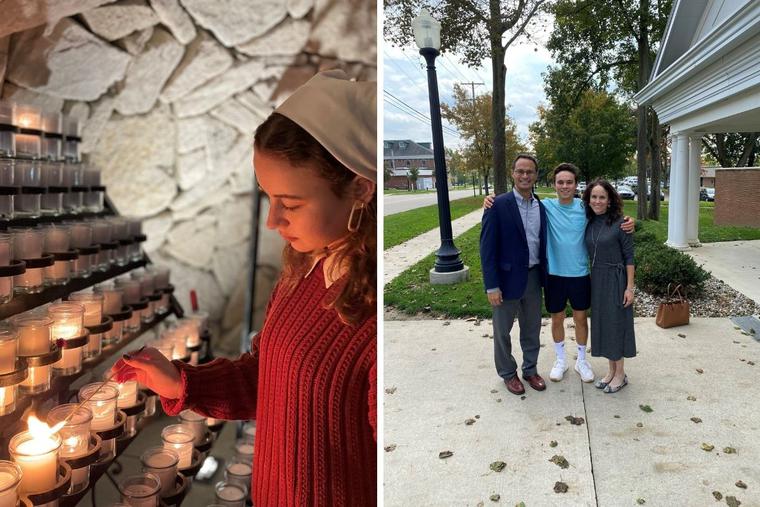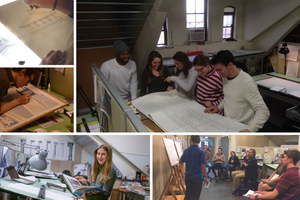Starting College in COVID Times: Catholic Freshmen Navigate Transition With Faith, Fortitude
The adjustment has been uniquely challenging for the Class of 2025.

Maura Flynn of Bowie, Maryland, felt “super at home” upon her arrival at Franciscan University of Steubenville in Ohio a few months ago. After all, both of her parents were alumni, and she looked forward to sharing a room with a high-school friend.
Flynn’s first week took a surprising turn, however, when, just days later, her roommate contracted COVID-19 and was immediately sent home.
“That shook me up,” Flynn said. “I thought I would have a buddy, a safe spot and security to walk around campus with.”
Flynn said she took her concerns to prayer.
“I realized I needed to live on mission this week,” she said. “The Lord was calling me to reach out to people that were lonelier than me.”
Flynn said she found it challenging to enter a room of people playing ping pong, for example, and to approach a girl sitting alone with her phone.
After the fact, though, she called the opportunity a “blessing in disguise.”
“It bore so much fruit in my own life and led to really authentic friendships,” Flynn said. “It forced me to see Christ in other people.”
Flynn is not alone. College freshmen away from home for the first time, making new friends and adjusting to a new schedule, complete with academic rigors — all compounded with COVID stress — are finding their start-to-college experience has unique challenges, as well as how to deal with them, amid time-honored rites of passage.
Charlie Hill of Shawnee, Kansas, also has found the COVID-19 pandemic an added obstacle in navigating the transition to college.
Hill remembered clearly the day schools and stores suddenly shut down in March 2020, because he had a campus visit planned the next weekend. In-person visits were immediately canceled, he said, and virtual visits became the norm.
“You can still get a feel for the people through online Zoom meetings, but you can’t really gauge what the campus is like without being there in person,” Hill said.
COVID-19 created a special concern for Hill’s family, because his father, Chuck, is the recipient of a kidney transplant that saved his life but left him vulnerable to contagious illness.
Throughout the latter part of high school, Charlie said he agonized about exposing his father to COVID-19. Even after being vaccinated, he said he is still somewhat concerned about bringing the virus home from Wichita State University in Kansas, where he is currently a freshman.
“The fact that I’m not around my dad as much anymore helps me relax,” he said, adding that he continues to wear a mask indoors on campus for the safety of himself and those around him.
Joe Wurtz, dean of students at Benedictine College in Atchison, Kansas, confirmed that COVID-19 has created a great amount of stress for incoming students and their families.
“Students are worried … ‘Will my college be in person?’” he said. “Do I want to pay x amount of dollars to go to an institution where I’m not going to encounter the college life I’ve been shown?”
Wurtz said the pandemic coupled with nationwide protests in recent months and “perennial” concerns like choice of major, finances and friendship present a difficult scenario for “Gen Z.”
To assist students in successfully navigating the college transition, Wurtz teaches them the “W Curve,” a well-researched model that outlines five stages most students undergo during their first year of college.
According to the article “Culture Shock and the First-Year Experience,” by William J. Zeller and Robert Mosier for the Journal of College and University Student Housing, the five stages are: honeymoon (first few weeks), culture shock (after first exam), initial adjustment, mental isolation (often after Christmas break) and integration.
“Most students go up and down, up and down, until they’ve adapted to the [college] culture,” Wurtz said.
In the midst of the “valleys,” Wurtz encourages students to seek out support systems available on campus: writing center staff, faculty member, academic adviser, resident hall assistant, spiritual director or coach.
“You’re going to fail sometimes, and that’s okay — as long as you learn from it,” he said.
For Paul Sri of Lone Tree, Colorado, these principles have played out clearly in his first months at Hillsdale College in Michigan.
Sri said that navigating the friendship-making process brought one of the most unexpected challenges.
“I thought it would be very easy to meet certain people and say, ‘Okay, I want to be friends with them,’” he said.
Instead, Sri noticed a tendency to hang out with whomever he happened to meet first.
“I’m either with them or I’m by myself,” he said. “It’s still hard to find the people I want to become friends with and be deliberate about that.”
Sri pointed to time management as another difficult aspect of college life.
“I prioritized my social life in the first few weeks, and it came back to bite me,” he said, admitting that he recently wrote an 800-word essay an hour before the deadline.
Since receiving a poor grade on that assignment, Sri said he is working to create a balanced routine for homework, prayer, eating, sleeping, exercise and friends.
Maria Rutledge, a native of Lincoln, Nebraska, and a freshman at Benedictine College agreed that the freedom of the college schedule requires self-discipline.
“At first it was like, ‘Oh, I have two free hours, so I can go get a coffee and hang out with my friends,’” Rutledge said, “Now, I try to do homework.”
For Libby Dickinson, a sophomore at Hillsdale College, choosing the right space to study makes a difference. She learned this lesson as a home-schooler in Omaha, Nebraska, and has translated it to her college routine.
“Trying to study in the campus coffee shop is similar to trying to study during toddler playtime [at home],” she quipped.
Dickinson also emphasized the importance of drawing strength from her Catholic faith.
“When I get stressed, I tend to … put my spiritual life on the back burner,” she said, adding that she has a tendency to think, “Oh, I don’t have time to go to Mass because I have to write that paper.”
Dickinson admitted that while it is tempting to allow academic expectations to overshadow other areas of life, she said she frequently returns from Mass or prayer time “totally refreshed.”
“It’s a hard hill to climb, and you can’t climb it without God’s help,” she said. “I’ve tried, and it doesn’t work.”
Rutledge grew up next door to a Catholic church and recalled her father frequently taking her to visit Jesus in the Blessed Sacrament. As she got older, she started taking her siblings.
“It taught me the importance of keeping a good faith schedule,” she said, such that it is now second nature for her to pop into a campus chapel for a quick visit between classes.
Sri noted that the nondenominational environment at Hillsdale has prompted questions from non-Catholics that have sometimes been difficult for him to answer.
“It helps to have a theologian dad,” he quipped, referring to Catholic author and speaker Edward Sri.
Sri said he has appreciated the opportunity to engage in respectful dialogue with students of all faith backgrounds.
“I know it will be very fruitful to have these conversations with other Christians to really make the faith my own,” he said.
Father Dan Andrews, pastor and director of St. John Paul II Newman Center at the University of Nebraska in Omaha, encourages freshmen to lean on their faith in the midst of the challenges, whether that means taking advantage of campus ministry at a faith-based college or finding the Newman Center at a secular university.
“The people who are looking for bigger answers to the problems that life presents — those that are already stepping into a relationship with God — are finding answers to that question of ‘Why am I here?’” he said. “It’s just a world of difference to have an avenue toward ultimate meaning and purpose in times when not a lot makes sense.”
Father Andrews acknowledged the courage required to enter a new community, but he encourages students to “step forward” in faith.
“Just come and meet one or two people,” he said, “and a whole bunch of doors will open up.”
- Keywords:
- catholic colleges
- college students
- catholic college students
- covid-19
- coronavirus
- kimberly jansen















